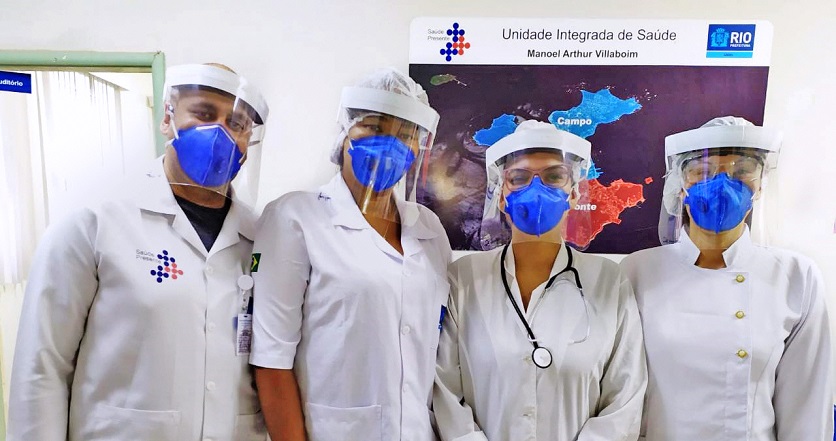Rising from Crisis: Responding to the Pandemic (2)
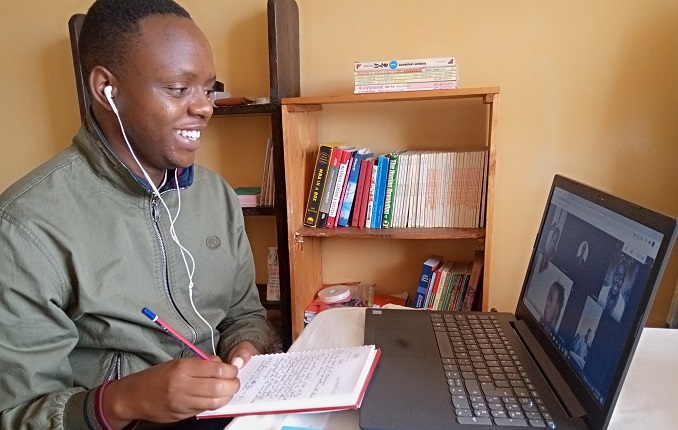
This is the second in a two-part series giving an overview of how Soka Gakkai organizations are responding to the COVID-19 pandemic. The articles, compiled from the Rising from Crisis series on the Soka Gakkai (global) Facebook page, look at how Soka Gakkai organizations around the world are striving to create value from the challenges posed by the pandemic.
In the words of Soka Gakkai President Harada: “We are determined that our hopeful, revitalizing philosophy of ‘changing poison into medicine,’ which teaches that even the darkest and most desperate of times can contain the seeds of new learning and possibility, will help strengthen humanity’s indomitable network of global citizens.”
COVID-19’s Social Impact
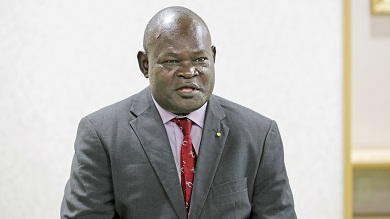
Philemon Banja (general director, Soka Gakkai Kenya): In Kenya, people have been wearing face masks in public places, maintaining social distancing, washing their hands frequently and using sanitizers. The majority of citizens are complying with the health protocol, but due to economic hardship, it has been a challenge for many of them to afford face masks and sanitizers.
Traditionally, Kenyans are extremely social people. So, people complained when the announcement was made to close restaurants, bars, eateries, church gatherings, large-scale funerals and wedding ceremonies.
Oscar Fernández (general director, SGI-Argentina): We closed all community centers on March 13 [2020], before the lockdown, and canceled all meetings and home visits. Immediately after the lockdown was imposed, we submitted a letter to the President of Argentina to express our commitment to offering our community centers for emergency use and providing aid to help solve problems during the novel coronavirus crisis. We also conveyed this commitment to our respective local administrations.
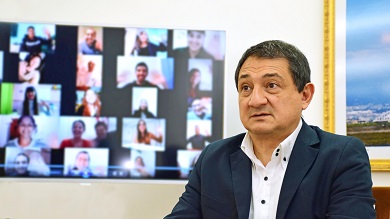
We also sent nonperishables and cleaning supplies to more than seven local authorities and donated 10,000 masks to Cañuelas, Buenos Aires, where the Ikeda Youth Culture Center is located. We rose to action to contribute to society in accord with one of the guiding principles given to us by President Daisaku Ikeda to be good citizens. We are determined to spread the message of hope throughout Argentina. We can transform the hardships inflicted by the novel coronavirus into the cause to open up a new age of humanism through our actions as Bodhisattvas of the Earth.
Wu Chin Jung (women’s leader, Taiwan Soka Association): I still vividly remember the fear the whole of Taiwan went through in 2003, watching confirmed cases of SARS rise every day with a lockdown imposed on hospitals to contain the outbreak.
It was in late January [2020], just before the Chinese New Year holidays, that Taiwan had its first confirmed case of the novel coronavirus. Measures reflecting lessons learned from the SARS experience were immediately taken: the government requisitioned all domestically produced masks, launched a rationing system and quickly tightened entry and quarantine controls.
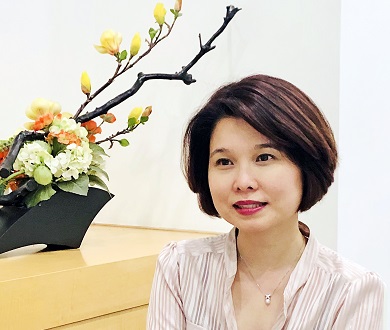
I feel that one of the reasons why the Taiwanese citizens never panicked is that the government disclosed detailed information frequently. We immediately launched an epidemic response headquarters headed by Taiwan Soka Association’s General Director Lin Chao, closed all community centers and stopped all meetings and home visits starting on February 1, and this is still being followed. Based on official information from the authorities, we are doing our best to help ensure public safety and health in close coordination with society at large.
Even though community spread has been successfully contained in Taiwan, consequences of the global economic recession are growing increasingly serious. Many people have been laid off or asked to take unpaid leave by their employers. This makes me keenly aware of the fact that we are all members of a global village.
Moreover, people can easily suffer from mental health challenges now because they are seeing their friends less and are worried in a social environment that is full of uncertainties.
Soka Gakkai Members’ Experiences
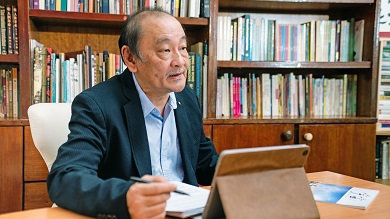
Koh Sia Feai (general director, Soka Gakkai Malaysia): One woman was forced to close down her hotel due to the government restrictions. With absolutely no income, she was overwhelmed with an indescribable feeling of anxiety. But she stood up in faith regardless of her problems and fervently chanted Nam-myoho-renge-kyo. Then she realized that her hotel could accommodate workers from companies that were exempted from the restrictions like those from infrastructure companies. She also contacted an oil company that decided to rent her hotel for a period of time to accommodate their employees. With the oil company employees occupying 50 percent of the rooms, it was possible for her to receive revenue thereby saving her hotel as well as the livelihoods of her employees.
There are also members fighting hard in the health care field. A young man who is a doctor started to produce face shields as he treated patients in a hospital. These came to the attention of the state government and are now being widely used in health care facilities within the state.
Kim In Soo (general director, Korea SGI): Many members who are doctors, nurses and pharmacists have been dedicated to treating COVID-19 patients on the front line.
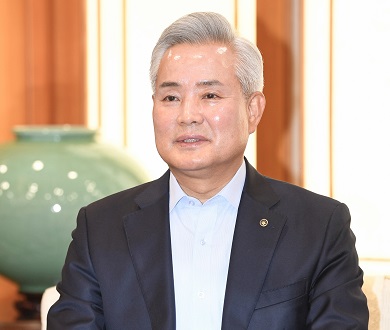
A young woman in Daegu, the city that saw the largest number of cases of COVID-19 infections in Korea, is a nurse at a local health care facility. She says that she felt like she was working in a battlefield at her hospital, with so many patients being brought in one after another. She could not go home for a long time. She couldn’t stop crying and felt like running away. When she was finally able to go home, she chanted earnestly to the Gohonzon, the Buddhist scroll that is the object of devotion for Nichiren Buddhists. She realized that she was the one who had chosen to become a nurse, and she renewed her pledge to fulfill her mission as a disciple of President Ikeda. She summoned all her courage and went back to work, giving her all to caring for her patients.
Recently, a letter was sent to the staff of her hospital, including her, from the daughter of a patient who had sadly died, thanking them for not giving up on her father and doing everything they could for him up until the end. This letter reminded her of the importance of her mission as a nurse. She continues to dedicate herself to caring for her patients with sincerity and compassion.
Making Sense of the Pandemic
Philemon Banja, (general director, Soka Gakkai Kenya): A piece of President Ikeda’s guidance that I hold dear to my heart is found in The New Human Revolution, volume 30, Chapter 6, which reads: “The harder we continue to strive without letting difficulties defeat us, the more our spirits are forged, strengthened and deepened, fostering the power to overcome any challenge. At the same time, we attain an expansive life state that enables us to understand the sufferings and sorrows of others, to empathize with those who are struggling and to sincerely support and encourage them. When we live undeterred by suffering, fearlessly challenging our problems and moving forward, this itself attests to the tremendous power of Nichiren Buddhism.”
I like this guidance because it gives hope and sparks confidence that no situation, no matter how harsh, cannot be overcome.
My determination is to seize this opportunity, taking advantage of online technology, to share Nichiren Buddhism—a philosophy upholding the dignity of life—with many people. Despite this devastating situation, I am determined to stand shoulder to shoulder with our members and contribute to society and the happiness of the people of Kenya in any way possible in order to achieve victory.
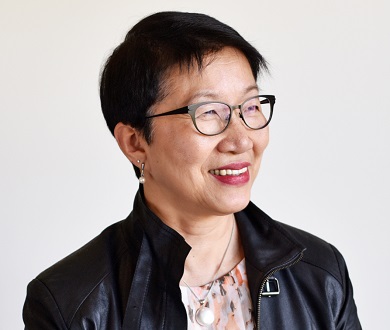
Bee Choo Lim (women’s leader, SGI-New Zealand): It is still difficult to comprehend the reality of the situation and living in this “new normal” life. It will be more challenging to do our Buddhist activities, and we have to use our wisdom and creativity to do what we can for our members and find ways to support and encourage one another. However, everything has meaning in Buddhism. We may not understand it right now, but there is reason for this situation. The important thing is to accept it and look at it positively, and move forward with ever more vigor and fighting spirit. I can see some positive things happening because of the pandemic that would not have happened otherwise. Members are really united in challenging and transforming the situation together.
President Ikeda says: “When your determination changes, everything will begin to move in the direction you desire. The moment you resolve to be victorious, every nerve and fiber in your being will immediately orient itself toward your success. On the other hand, if you think, ‘This is never going to work out,’ then at that instant every cell in your being will be deflated and give up the fight.”
With good understanding and resolute faith, we can face our challenges and have a victorious outcome.
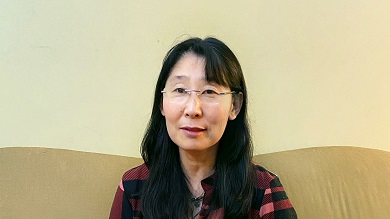
Naoko Leslie (women’s leader, SGI-USA): The United States has been facing an extremely difficult situation, one that we have never experienced before. But I strongly feel that now is the time to uphold President Ikeda’s guidance and transform adversity into hope. In accordance with the passage from Nichiren’s writings, “praying as earnestly as though to produce fire from damp wood, or to obtain water from parched ground,” we continue to pray as one with our fellow members around the globe with the firm conviction that we will put an end to this crisis, no matter what, while expanding our spheres of one-to-one encouragement within and also beyond SGI-USA.
Robert Rescoussié (president, Soka Movement in France): We can say that one of the causes of the global spread of the novel coronavirus is our own actions that have placed utmost priority on economic development. We need a philosophy that values life above anything else. Also, the fight against a pandemic involves everyone. Toward the earliest possible end to the spread of the coronavirus, the whole of humanity must work together to confront it.
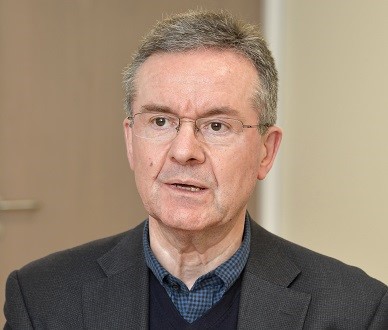
In this sense, I am convinced that the philosophy of the Soka Gakkai of seeking happiness for oneself and others can be a crucial guiding principle. We should not seek happiness for ourselves alone, but for ourselves and others, as well as peace and prosperity for the whole of society through the inner transformation of our lives.
Nichiren Daishonin lived in a time of ceaseless disasters including devastating earthquakes, floods, epidemics and famine: people at that time were suffering severely. It was against this background that he stated: “If you care anything about your personal security, you should first of all pray for order and tranquility throughout the four quarters of the land, should you not?” In his writing I strongly feel that our Buddhist philosophy that upholds the dignity of life is becoming increasingly vital now.
The Rising from Crisis Facebook series was based on a series of interviews with leaders of various Soka Gakkai organizations around the world carried out over the course of 2020 and published in Japanese in the Seikyo Shimbun, the Soka Gakkai’s newspaper.





